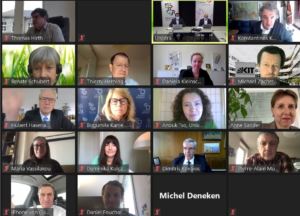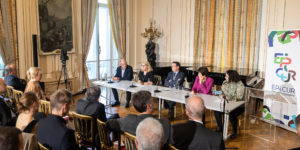The project news
Coming from Austria, France, Greece, Germany, Poland and the Netherlands, the EPICUR Alliance members met in Brussels during the European Universities Initiative kick-off meeting from 6th to 8th November 2019. It was a great opportunity for the presidents, rectors and political leaders, to exchange views and perspectives.Michel Deneken, the President of Strasbourg University and chairman of EPICUR, underlined “the importance of the involvement of students who must be the first users and ambassadors of our EPICUR Alliance”.
Created on 1st November 2019, EPICUR started with a kick-off meeting at the University of Haute-Alsace in Mulhouse. Bringing together nearly 40 persons, the meeting combined both team building activities and an efficient launch of the 6 work packages. Christelle Roy, the EPICUR Strategic coordinator, commented: “These 3 days allowed the teams to get to better know each other. It was really pleasant to work in a very enthusiastic atmosphere, each of us measuring, of course, how challenging the project is but also expressing a strong will and a full confidence in ourselves to be successful. This fruitful kick-off meeting promises the best for the project continuation.”
The project objectives
EPICUR Alliance will be multilingual and committed to a strong intercultural awareness. It will offer physical, virtual and blended mobilities, encouraging the free movement of students and staff through innovative teaching and learning models on our connected campuses. In a near future, not only EPICUR university will be connected but also their regions, taking full advantage of their respective existing networks. EPICUR will take care of involving staff and students in its construction and hence, in the governance bodies. It has been a key topic of the Steering Committee as well as the implication of associate partners.
EPICUR rectors and presidents welcome the promising beginning of the project and their progress in the search of additional funds for enhancing the ambition of EPICUR in terms of research and innovation.
The main deliverables and activities expected are as follows:
– Consolidate and connect study programmes in the field of European languages, establishing a model language policy for multilingual universities.
– Expand the teaching offer in the field of Liberal Arts and Sciences, working towards a‘European Bachelor of Liberal Arts and Sciences’.
– Create a virtual inter-university EPICUR campus environment to broaden the opportunities for virtual mobility and the development of new courses, testing a learning platform based on gamification.
– Strengthen inter-regional meta-networks, developing master labs and research internships for graduate students in partnership with societal partners and private enterprises.
– Foster university community involvement and appropriation of the Alliance through annual forums, ambassador programmes, challenges and festivals. Learn more about the 8 partners
In a near future, not only EPICUR university will be connected but also their regions, taking full advantage of their respective existing networks. EPICUR will take care of involving staff and students in its construction and hence, in the governance bodies. It has been a key topic of the Steering Committee as well as the implication of associate partners.
The EPICUR Alliance partners are:
– Adam-Mickiewicz University of Poznań, Poland;
– University of Amsterdam, The Netherlands;
– Aristotle University of Thessaloniki, Greece;
– University of Freiburg, Germany;
– University of Haute-Alsace, France;
– Karlsruher Institute of Technology, Germany;
– University of Natural Resources and Life Sciences, Vienna, Austria;
– University of Strasbourg, France
The EPICUR Alliance represents a total of:
– 307,000 students
– 40,000 staff, including 21,000 academic staff/researchers
Learn more about Adam-Mickiewicz University, Poznań – Poland
The Adam Mickiewicz University in Poznań, named after a prominent Polish poet, is one of the three leading Polish universities and can draw on 100 years of history. More than 40,000 students and 1,300 doctoral students take courses and conduct research in 15 faculties in total.
Learn more about the University of Amsterdam – The Netherlands
The University of Amsterdam, founded in 1632, enjoys a reputation for world-class excellence in research and training. It is a leading comprehensive university in its wide set of disciplines. More than 30,000 students take courses in its seven faculties and more than 3,000 doctoral students are conducting research.
Learn more about Aristotle University of Thessaloniki – Greece
With its 74,000 students, Aristotle University of Thessaloniki is the largest Greek university. Founded in 1925, this general university is one of the scientific centres of attraction in South East Europe. A.U.Th. comprises 42 schools serving a vast array of scientific fields, ranging from natural, agricultural and technological to social and health sciences, arts and humanities. More than 2.000 academic staff and 4,000 doctoral students conduct research in its eleven faculties.
Learn more about the University of Freiburg – Germany
Founded in 1457, the Albert Ludwig University of Freiburg im Breisgau welcomes some 25,000 students. It is characterised by a mix of traditional disciplines and modern technology. Its comprehensive training offer extends from information technology to the humanities and social sciences, through to natural sciences and medicine.
Learn more about the University of Haute-Alsace – France
The University of Haute-Alsace has 11,000 students, enrolled in more than 180 courses from DU, DUT level, Bachelor degree, engineering degree, master degree, up to PhD level, taught in 4 faculties, 2 IUTs and 2 engineering schools in Mulhouse and Colmar, France. It also has 13 research laboratories carrying out fundamental to applied research. As a highly innovative multidisciplinary university, it is recognised for the quality of its vocational education (including 50 apprenticeship programmes) and crossborder training (with more than 10 bi- or tri-national) programmes.
Learn more about the Karlsruhe Institute of Technology – Germany
Being “The Research University in the Helmholtz Association”, KIT creates and imparts knowledge for the society and the environment. It is the objective to make significant contributions to the global challenges in the fields of energy, mobility, and information. For this, about 9,300 employees cooperate in a broad range of disciplines in natural sciences, engineering sciences, economics, and the humanities and social sciences. KIT prepares its 24,400 students for responsible tasks in society, industry, and science by offering research-based study programs. Innovation efforts at KIT build a bridge between important scientific findings and their application for the benefit of society, economic prosperity, and the preservation of our natural basis of life. KIT is one of the German universities of excellence.
Learn more about the University of Natural Resources and Life Sciences, Vienna – Austria
The University of Natural Resources and Life Sciences Vienna (BOKU) founded in 1872, does research and education for sustainable development and renewable resource management including bioeconomy. BOKU covers natural sciences, technology and economics, has currently 12 500 students and a faculty and staff of 2900 employees. The university offers 7 Bachelor and 25 Master programs where half of them are taught in English. 400 industrial cooperation partners exhibit the strong engagement in creating a green economy for a sustainable future.
Learn more about the University of Strasbourg – France
The University of Strasbourg welcomes 51,000 students, of which 20% are international students covering 150 nationalities. With its 35 components, 78 laboratories and research units, it is distinguished by the multidisciplinary and interdisciplinary nature of its training offer. It conducts a research of excellence provided by nearly 2,800 lecturer-researchers, including five active Nobel Prize winners.In addition of EU funding, the University of Strasbourg receives financial support from the french National Research Agency (ANR), within the framework of Investments for the Future programme in higher education which brings additional funding to European university projects very positively evaluated. Christelle Roy comments: “These additional funds will allow us to fully achieve our consolidation objectives within the framework of project governance”.




